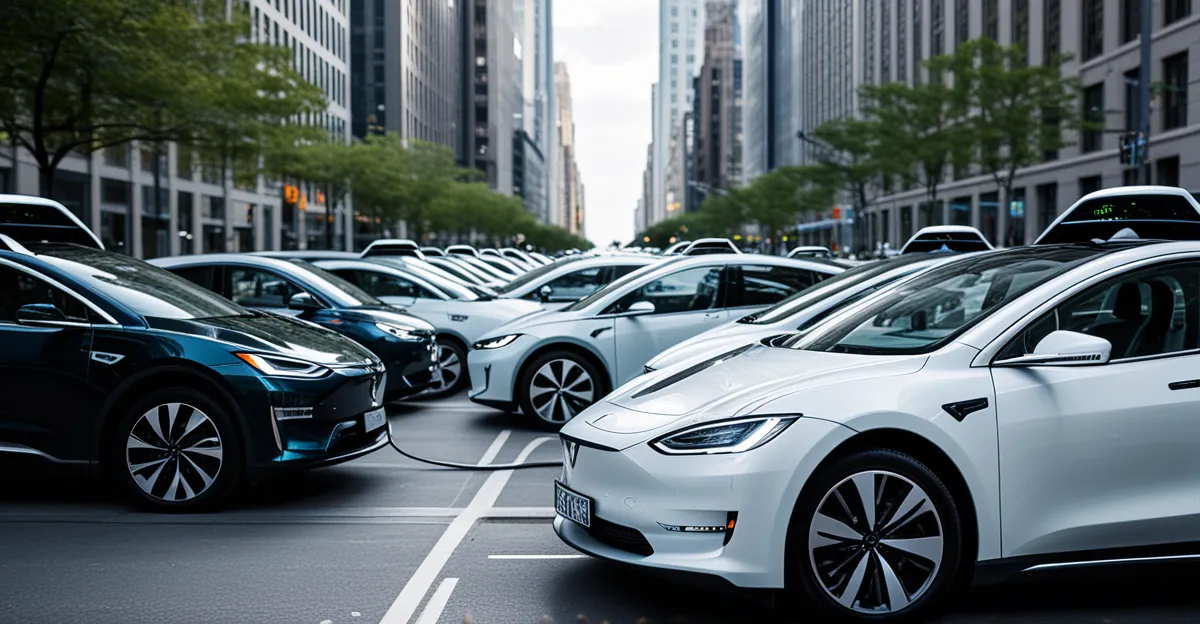The evolving impact of electric cars on urban transportation
Electric cars are rapidly reshaping urban mobility by offering cleaner, quieter alternatives to conventional vehicles. As cities grapple with congestion and pollution, electric vehicles (EVs) have become a focal point in city transportation strategies worldwide. Their adoption is spurred by favorable policies, including incentives and stricter emissions regulations, which encourage residents to switch from fuel-powered cars to electric models.
Key trends reflect a growing market share of electric cars in urban areas, driven by improved battery technology and falling costs. This shift is not just about cleaner air; it fundamentally alters how people move within cities. Electric vehicles support new mobility patterns such as shared car schemes and last-mile connectivity combined with public transit.
In the same genre : What Are the Innovations Reshaping the UK Automotive Industry?
With ongoing investments in charging infrastructure and smart city initiatives, electric cars increasingly fit into an integrated urban transport network. This integration promotes efficiency and reduces reliance on fossil fuels, helping cities meet environmental targets. Overall, electric cars play a pivotal role in evolving urban transportation by reducing emissions, managing congestion, and enhancing the sustainability of city living.
Benefits of electric vehicles for urban environments
Electric vehicle advantages extend well beyond just reducing greenhouse gases. One of the most immediate benefits is the significant improvement in urban air quality. Unlike conventional engines, electric cars emit no exhaust pollutants, which directly reduces harmful airborne particles in cities.
Additional reading : How Will Future Technologies Transform UK Automotive Manufacturing?
These improvements in air quality contribute to better public health by lowering rates of respiratory illnesses. Additionally, electric cars help alleviate traffic congestion. Their integration with urban mobility models encourages shared vehicle use and reduces reliance on private, fossil fuel-powered cars. This shift leads to fewer cars on the road and smoother traffic flow.
Studies from various cities demonstrate these benefits. For example, cities with growing electric car adoption often experience measurable drops in nitrogen oxide and particulate matter levels. This contributes to a more pleasant and healthier urban environment. Incentives for electric vehicle use also promote these advantages by encouraging wider adoption.
In summary, electric cars play a crucial role in enhancing urban environments through cleaner air and congestion reduction. Their contribution amplifies as more cities incorporate electric vehicles into comprehensive city transportation plans. This positive impact makes electric cars an essential piece of sustainable urban development.
Technological advancements and infrastructure needs
Electric car adoption in urban areas accelerates with continuous EV technology improvements. Battery efficiency is a key factor—newer electric vehicles offer longer ranges and shorter charging times, making them practical for daily urban use. These technological leaps reduce range anxiety, encouraging more drivers to switch to electric.
Alongside vehicle advances, expansion of charging infrastructure is critical. Cities are investing heavily in public charging stations, including fast chargers and wireless options, to support increasing EV numbers. This makes charging more convenient and accessible, especially in dense urban settings where private charging may be limited.
Moreover, integration with smart grids enhances urban energy management. Smart grids enable dynamic load balancing and renewable energy usage, crucial as electric cars become significant power consumers. These systems help prevent overloads and lower carbon footprints.
Urban development strategies incorporate electric mobility by redesigning streets and parking spaces to accommodate charging points. Effective charging infrastructure and EV technology facilitate smooth integration of electric cars into city life, promoting sustainable urban development. With these technological and infrastructural advances, electric cars are increasingly embedded within modern urban mobility frameworks, addressing both convenience and environmental goals.
Challenges for cities adopting electric mobility
Integrating electric vehicles into existing urban planning presents complex challenges. Cities must adapt designs to accommodate new electric car infrastructure while ensuring seamless coordination with public transit systems. Space constraints in dense areas make installing sufficient charging infrastructure difficult, raising concerns over equitable access. Without careful planning, some neighborhoods may face underinvestment, exacerbating social disparities.
Cost barriers also loom large. Transitioning to electric mobility requires significant funding beyond vehicle subsidies—cities must invest in building and maintaining charging networks and upgrading power grids. These expenses can deter smaller municipalities or those with limited budgets. Additionally, the pace of electric vehicle integration demands flexible, forward-thinking policies that anticipate evolving technology and usage patterns.
Effective strategies focus on multifunctional urban designs that integrate electric vehicle facilities with broader mobility networks, including bus routes and bike lanes. Encouraging public-private partnerships can help share infrastructure costs. Prioritizing equitable deployment ensures all residents benefit from cleaner, efficient urban mobility, addressing both environmental and social goals.
In sum, cities face multifaceted hurdles in electric vehicle integration, requiring coordinated policy, infrastructure investment, and urban design innovation to realize sustainable transportation futures.
Future outlook for electric cars and urban sustainability
Electric cars are expected to significantly influence the future of urban mobility by continuing to transform city transportation systems. As adoption rates rise, these vehicles will drive more sustainable modes of travel, reducing reliance on fossil fuels and advancing urban sustainability goals. Increasingly, electric cars will integrate with public transit and shared mobility platforms, creating seamless, multimodal transport networks that prioritize efficiency and environmental responsibility.
The electric vehicle impact on urban sustainability extends beyond emissions reduction. Electric cars will also influence how cities plan and design infrastructure, encouraging green spaces and less car-centric layouts. Cities envision a future where sustainable transportation is the norm, supported by smart grids and adaptive traffic management systems that optimize flow and energy use.
Cross-sector collaboration is vital for this future. Municipal governments, private industry, and community organizations must work together to develop policies, funding mechanisms, and innovative technologies. This collaboration ensures equitable access to electric cars and the benefits of sustainable urban mobility across all neighborhoods, helping cities achieve broader environmental and social objectives.






